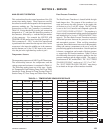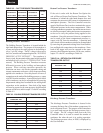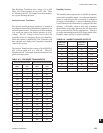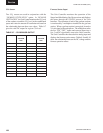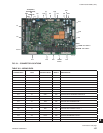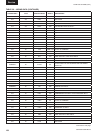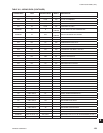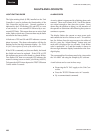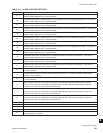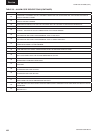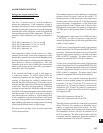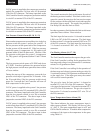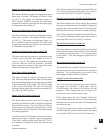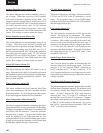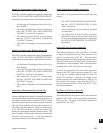
164
JOHNSON CONTROLS
FORM 100.50-NOM6 (1207)
Service
24 VAC power is supplied to the compressor protection
module for compressor 2A from wire 443 at terminal
C30 of the P12 connector. The binary input back to the
Unit Controller from the compressor protection module
is wire 442 at terminal C30 of the P12 connector.
24 VAC power is supplied to the compressor protection
module for compressor 2B from wire 445 at terminal
C40 of the P12 connector. The binary input back to the
Unit Controller from the compressor protection module
is wire 444 at terminal C40 of the P12 connector.
Low Pressure Cutout Alarm (09, 10, 11, 12)
Since tandem compressors are used there is a single low
pressure switch for system 1 and one for system 2. If
the low pressure switch opens both of the compressors
for that system will be turned off. If the low pressure
switch for system 1, (compressors 1A, 1B), opens it will
generate both a 09 and 10 alarm code. Likewise if the
low pressure switch opens for system 2, (compressors
2A, 2B), opens it will generate both an 11 and 12 alarm
code.
The low pressure switch opens at 50 PSIG and closes
at 71 PSIG. In order to generate a low pressure lockout
the high pressure switch must open three times within
a 2 hour window.
During the start up of the compressor system the low
pressure switch input is ignored for 30 seconds. After
the 30 second delay if the low pressure switch circuit
opens for 5 seconds the Unit Controller will turn off
both compressors for the system.
24 VAC power is supplied to the system 1 low pressure
switch circuit from wire 395 at terminal LPS1 of the P15
connector. The binary input back to the Unit Controller
from the low pressure switch is wire 396 at terminal
LPS1 of the P15 connector. The above input is then
jumpered to terminal LPS2 of the P15 connector.
24 VAC power is supplied to the system 2 low pressure
switch circuit from wire 433 at terminal LPS3 of the P16
connector. The binary input back to the Unit Controller
from the low pressure switch is wire 434 at terminal
LPS3 of the P16 connector. The above input is then
jumpered to terminal LPS4 of the P16 connector.
Limit Switch Alarms (13, 14, 15)
The control monitors the limit switch status for each of
the heating sections installed. If the limit switch circuit
opens the control de-energizes the heat section output
for the section with the open limit circuit and energizes
the indoor blower output. The supply fan performs a
Fan Delay Off when the limit re-closes.
In order to generate a limit lockout the limit switch must
open three times within a 2-hour window.
The limit input for heat section 1 is located at terminal
LIM1 wire 507 of the P10 connector. The limit input
for heat section 2 is located at terminal LIM2 wire 522
of the P10 connector. The limit input for heat section
3 is located at terminal LIM3 wire 533 of the P10
connector.
Gas Heating Alarms (16, 17, 18)
The Unit Controller monitors the output to the gas valve.
If the Unit Controller is calling for the operation of the
heat stage and voltage is not present after 5 continuous
minutes it will generate an alarm.
If the Unit Controller is not calling for the operation of
the heat stage and voltage is present at the gas valve for
5 continuous minutes it will generate an alarm and lock
on the supply fan. If the input goes away the control
will revert to normal operation.
The gas valve input for heat section 1 is located at
terminal GV1 wire 510 of the P10 connector. The gas
valve input for heat section 2 is located at terminal GV2
wire 525 of the P10 connector. The gas valve input for
heat section 3 is located at terminal GV3 wire 536 of
the P10 connector.
Space Temperature Sensor Alarm (19)
This alarm indicates the space temperature input is
either open or shorted. The display will show a value
of –40.0° F. The space temperature input is at ST and
GND of the P6 connector. To trouble shoot compare the
resistance of the input to the temperature in the space
using Table 8-1.



